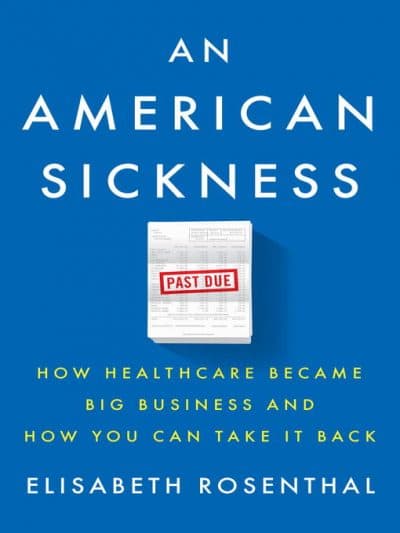Advertisement
'An American Sickness' Diagnoses Our Health Care System

Elisabeth Rosenthal, editor in chief at Kaiser Health News, is not afraid to be blunt in her assessment of U.S. health care.
"The American healthcare system is rigged against you," she writes in her new book. "We hate our healthcare system. And yet, we've come to accept it as an inevitable burden of being American."
The 22-year veteran of the New York Times says the big business of health care has taken advantage of us all. She details how doctors, hospitals, drug companies and insurance providers have evolved to exploit.
Elisabeth Rosenthal will be speaking at the Harvard Book Store on Thursday, April 13 at 7:00 p.m.
Guest
Elisabeth Rosenthal, editor-in-chief at Kaiser Health News and author of "An American Sickness: How Healthcare Became Big Business And How You Can Take It Back." She tweets @rosenthalhealth.
Interview Highlights
On how health care became a business
"A quarter century ago you could see some of these elements, the business elements, coming into health care. But I think it's really escalated, as we've seen all in the last 10, 15 years to new heights ...
The truth is, if you want kind of the patient-doctor relationships that we all say we value, it's not an inherently efficient operation. It shouldn't be run like a machine. Yet what's happened is this caring endeavor — which focused on what was best for the patient, what science showed — is now kind of underpinned by this commercial enterprise, whose values are those of business."
On how the business of health care impacts patient care
"When I was practicing medicine and certainly when my dad was practicing, there was this notion that thinking about the finances was not what you should be doing. One thing that really kind of amused and horrified me as I was preparing the book, was seeing that a lot of the pledges that the American Academy of Surgery uses, has taken out the 'without regard to a patient's ability to pay part.' So suddenly that became acceptable to think about — what are the finances, how much money is being made.
"... Think about something like diabetes. If you had a cure for diabetes, you would destroy literally, a multi-billion dollar industry of medicines, pumps ... In terms of looking at this as a business proposition, you don't want an immediate cure. You want people to be treated for life ... All of these treatments are good, they're valuable, they're wonderful. But there's no incentive to develop the ultimate treatment, which is to make the disease go away."
On why more competitors vying for business doesn't mean better prices in health care
"Initially, the whole trend to consolidate hospitals made a lot of sense, the way it does in any industry. You join together, you have efficiencies of scale in purchasing [so] not every hospital has to buy its own laundry sheets, not every hospital has to do heart surgery.
But what you see over time is consolidation reaches a tipping point, so that in many markets there's only one or two hospital systems left. And at that point, they do what any big organization does when it can control price: ... they say, this is what we're going to charge. And guess what? If you're a patient, you're not very well-positioned to say wow, if I'm in San Francisco, I see it's cheaper in L.A., I'm going to go there ... It's not like you're shopping around for health care ...
I think people should say to their physicians for example, if I need a blood test, please send me to a lab that's in-network so I don't incur out-of-network charges. Or if you tell me I need my elbow X-rayed, you should know physicians, which X-ray facility does that at the cheapest price. Because as we've seen in multiple papers now, one facility and another three blocks apart can be 100 percent different in price ... my challenge to physicians is to say, you're not going to send patients to the one that charges $1000. You can say to them sorry, my business isn't going to you anymore."
Advertisement
On the belief that the free market is best for health care
"To have a free market, you need prices — price transparency — so people can make choices. You need the ability to actually choose where you go. You need information ... So [health care now is] not a good market.
I mean if we look what a market looks like: Say you want to buy a Prius. You can go to five different Prius dealers and find out what it's going to cost and it won't cost a hundred times as much to buy a Prius in New Mexico as it does in New Jersey. So this is not a functional market. And I don't know that a functional market will ever solve this, because health care isn't a choice in many cases. For a functional market, I need to be able to go into the grocery store and say, blueberries are really expensive, I'm not going to buy them right now."
On if a single-payer solution would work in America
"Our decision is, is it in line with our cultural values? And everyone says, 'Oh no, we couldn't do a single-payer here.' I would say it doesn't line up perfectly, but our current health system is such a mess and people are so frustrated that in fact, a lot of physicians now are in favor of single-payer. So that's the crucial switch that usually flips when a country moves in that direction."
This article was originally published on April 12, 2017.
This segment aired on April 12, 2017.

